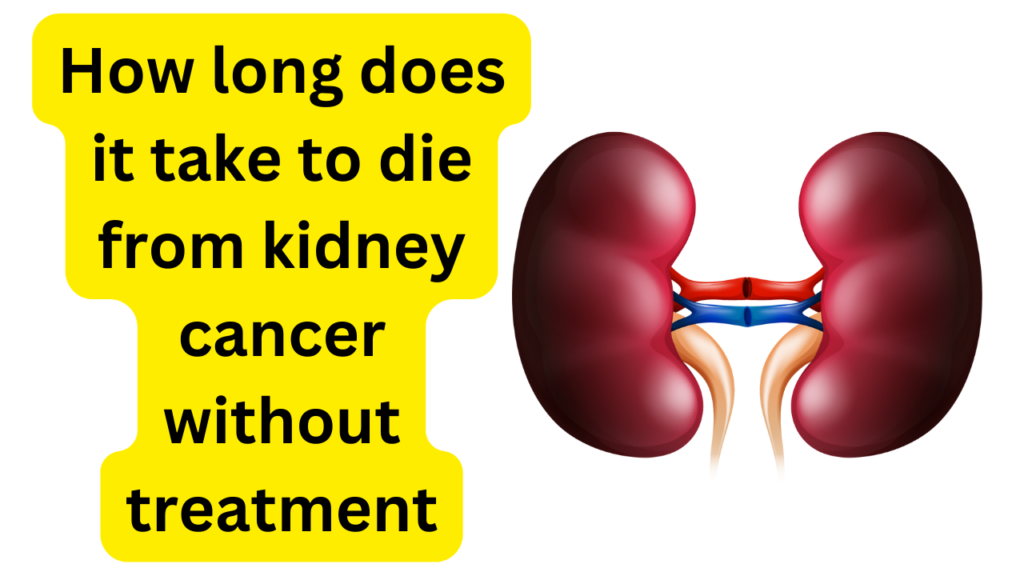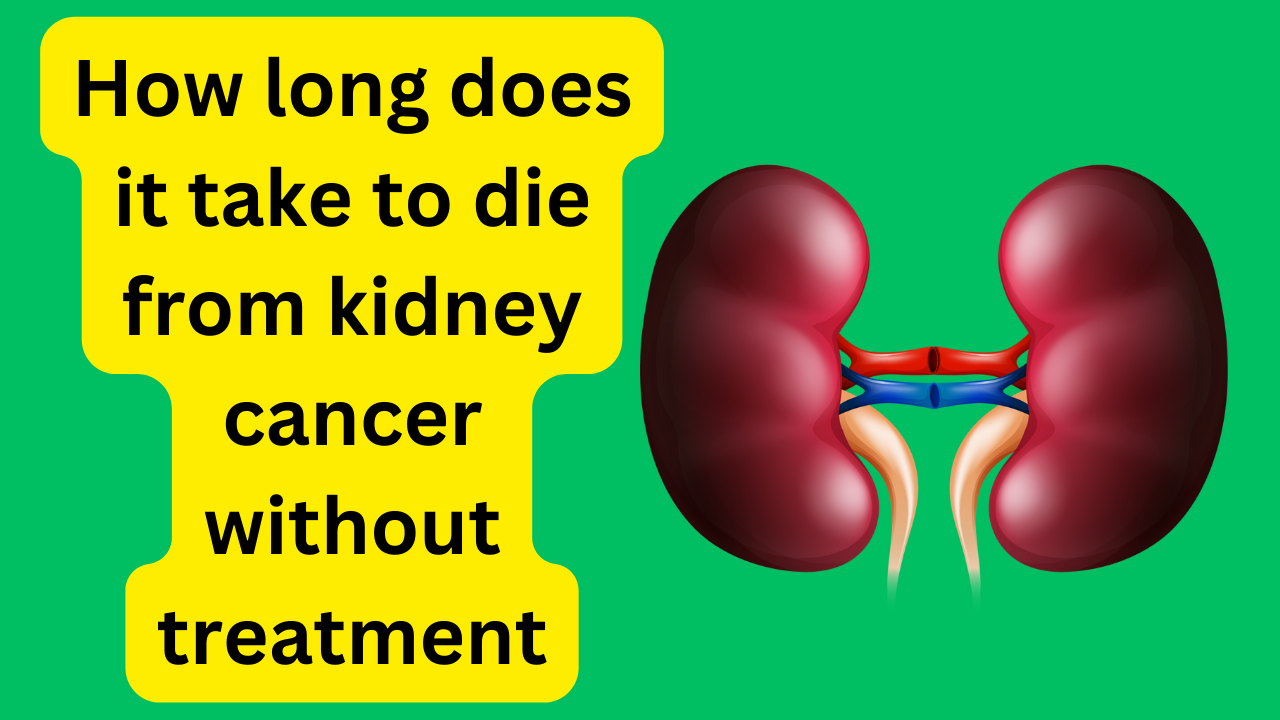How Long Can You Live with Kidney Cancer Without Treatment? | Early Symptoms About the Author A registered nurse with more than 25 years of experience in oncology, labor/delivery, neonatal intensive care, infertility and ophthalmology, Sharon Perkins has also coauthored and edited numerous health books for the Wiley “Dummies” series.
Kidney cancer, also known as renal cancer, is a dangerous disease that starts in the kidneys — the bean-shaped organs that help filter blood, balance bodily fluids, and produce necessary hormones.
Although large studies have shown that kidney cancer is often overlooked in comparison with other major cancers (e.g., lung, breast, and prostate) (Cohen, 2012), this cancer has an increasing incidence worldwide.
In this article, we will discuss everything you need to know about kidney cancer in regards to early signs, cause, risk factors, and — most importantly — how long does it take to die from kidney cancer without treatment. This information might also help you or a loved one act in time and maybe even save a life.
What are kidneys in the human body?

Before we get into kidney cancer, let’s just take a moment to understand what the kidneys do. Each of us has two kidneys that lie on each side of the spine below the ribcage. These crucial organs serve several important functions:
Filter the blood to eliminate waste, such as excess fluids and waste products.
Maintain appropriate electrolyte, including sodium, potassium and calcium
Aid in the regulation of blood pressure through renin production
Induce production of RBC via erythropoietin
Keep the proper acid-base balance in the body
Because the kidneys play a role in so many crucial bodily functions, cancer that strikes them can have many varied and serious health effects.
What Is Kidney Cancer?
Kidney cancer is when abnormal cells in one or both kidneys begin to grow out of control and form a lump (called a tumor). Renal cell carcinoma (RCC) is the predominant form of kidney cancer in adults, representing around 90% of cases. Uncommon types are transitional cell carcinoma, Wilms tumor (mainly in children), and renal sarcoma.
Early Symptoms of Kidney Cancer

Kidney cancer is especially deadly as it often remains undetected until it has already metastasized. And a lot of cases are found incidentally during imaging tests for unrelated problems. Yet, some of the typical signs and symptoms that present as the tumor grows are:
Description Blood in the urine (hematuria)
Chronic pain in the abdomen, lower back, or side (not always on the side of the affected kidney)
Fatigue and low energy levels
Unexplained weight loss
Loss of appetite
Fever of no infectious origin
Lump or mass in the side or lower back
Bulging lymph nodes in the neck or abdomen 3.
Anemia (low level of red blood cells)
If you or someone you know is experiencing any of these symptoms, it’s important to see a doctor promptly for evaluation.
How Long Can You Live with Kidney Cancer without Treatment?
Now, let’s turn to the most important question: How long does it take to die from kidney cancer without treatment?

The answer is not straightforward and depends on a number of factors:
Stage of the Cancer
Staging of Kidney Cancer Kidney cancer is staged from I to IV — where I is confined to the organ and IV has spread widely (metastasis) throughout the body. The greater the stage at diagnosis, the more aggressive the cancer and the higher the likelihood of the disease progressing without treatment.
Stage I or II: Untreated, localized cancer of the kidney can become terminal in several months to a couple of years. But when early the survival rate is fairly good.
Stage III or IV: Advanced kidney cancer that has spread to other organs (such as the lungs, bones or brain) can be fatal in a matter of a few months to a year if not treated.
Tumor Growth Rate
Research has demonstrated that small kidney tumors grow at an average rate of 0.3 cm per year (with an upper limit of 1.3 cm). Highly aggressive malignancies have a very aggressive course and early metastasize, which drastically reduces the patient’s life expectancy.
Age and Health of the Patient
If true, the faster rate of tumor growth in young age may be attributed to higher cell division activity in these patients. If you are older or have a compromised immune system, you may not last so long without treatment because of complications or other health problems.
Tumor Biology
Some types of kidney cancer are slow-growing (in the low-risk category), while others are aggressive (high-risk). A biopsy and imaging tests, such as CT scans, MRIs, and ultrasounds can indicate the nature of the tumor.
Average Survival Without Treatment:
People with advanced kidney cancer that has not been treated (Stage IV) generally live 6 to 12 months if they have the more aggressive type of this disease. Early-stage cancer patients may live 1 to 5 years, but unless treated, their cancer will spread and kill them.
Can Kidney Cancer Spread?
Yes, untreated kidney cancer can spread (metastasize) to other parts of the body. The metastatic sites can be listed as follows:
- Lungs
- Bones
- Liver
- Brain
When cancer metastasizes, treatment becomes more challenging, and survival rates plummet. This is why prevention and treatment is so crucial.
Risk factors for renal cell cancer
It can happen to anyone, but risk factors may elevate your risk of developing kidney cancer:
Smoking increases the risk to at least 50%.
Obesity: Hormone levels and kidney function is affected by obesity
High Blood Pressure: People with chronic high blood pressure are assumed to have a higher risk of getting renal cancer.
Family History: Particularly if a near relative had kidney cancer
Genetic Disorders: Examples vHL disease
Workplace Exposure: To substances such as asbestos or cadmium
Sex: Men are nearly twice as likely to develop kidney cancer.
The Role of Early Diagnosis and Treatment
Survivability for kidney cancer greatly depends on the stage of the diagnosis:
Stage II: Survival rate is more than 90% at the end of 5 years
II–III Stage : Around 70%–80%
Stage IV (metastatic): Between 12%–15%
They make it perfectly clear: early detection equals lives saved.
Treatment choices may result in:
Surgery to take out part of a kidney or the kidney (partial or radical nephrectomy)
Focused therapy (such as tyrosine kinase inhibitors)
Immunotherapy (works through the body’s immune system to target cancer cells)
Radiation (usually for relief of pain from spread of the cancer)
For small tumors in elderly individuals or for those who are at high risk, active monitoring
What to Do if You Think You Have Kidney Cancer
If you have any of these symptoms, don’t wait, go see a doctor now. Early tests may include:
Urinalysis (to look for blood or abnormal cells)
Other blood tests (for kidney function)
Ultrasound or CT scan
Biopsy (in certain cases)
Early detection can make a big difference in prognosis and treatment.
Conclusion
So, how long can you live if you survive untreated kidney cancer? The answer is—it depends. But what is clear is that without treatment, kidney cancer can be lethal, especially once it metastasizes beyond the kidneys. Those with late-stage untreated kidney cancer may survive only a few months to a year. For early-stage instances, the disease will be more likely to progress but will ultimately be lethal if untreated.
The secret to living a longer and healthier life is in knowing about the disease early and getting treated immediately. If you or someone you know is experiencing symptoms or at higher risk, don’t wait. Consult a doctor and/or get tested and discuss treatment.
Key Takeaways
Kidney cancer is typically a silent disease, but it can be lethal if it’s not detected early.
Symptoms include blood in urine, back pain, fatigue, or unexplained weight loss.
If untreated, kidney cancer may be deadly within months to several years, depending upon the stage and menaciousness of the tumor.
The chances of long term survival are significantly greater with early diagnosis.
FAQs
Q. Can kidney cancer cure itself?
Q: Can you cure kidney cancer naturally? A: No, kidney cancer does not go away on its own. Tiny tumors can even, over time, grow and spread.
Q: Is an operation always the answer?
A: Not always. Active surveillance may be applicable in some patients, especially the elderly. Nevertheless, radical extirpation still is the most efficacious treatment option for localized kidney cancer.
Q: What’s the typical age to be diagnosed with kidney cancer?
A: Most cases are diagnosed in individuals who are 60 and older, but the disease can happen at any age.


